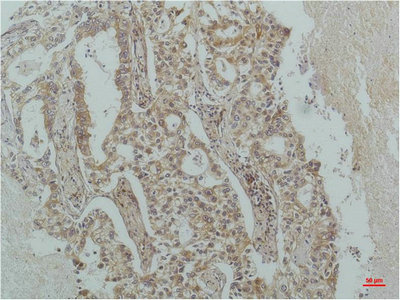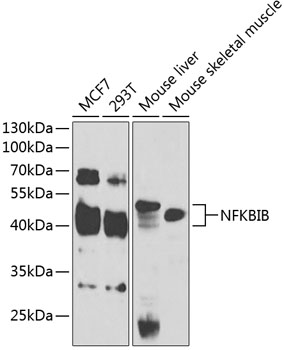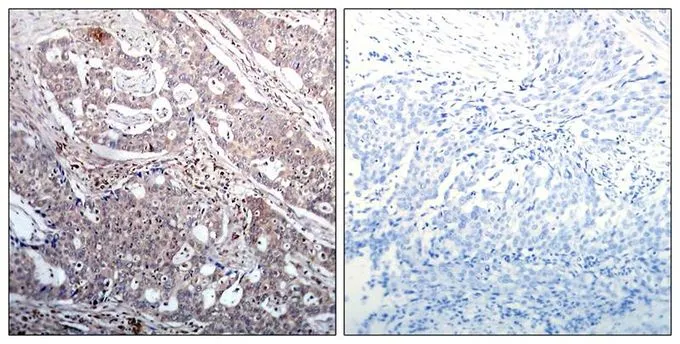
IHC-P analysis of human breast carcinoma tissue using GTX50317 IKB beta (phospho Ser23) antibody. Left : Primary antibody Right : Primary antibody pre-incubated with the antigen specific peptide
IKB beta (phospho Ser23) antibody
GTX50317
ApplicationsWestern Blot, ImmunoHistoChemistry, ImmunoHistoChemistry Paraffin
Product group Antibodies
TargetNFKBIB
Overview
- SupplierGeneTex
- Product NameIKB beta (phospho Ser23) antibody
- Delivery Days Customer9
- Application Supplier NoteIHC-P: 1:50-1:100. *Optimal dilutions/concentrations should be determined by the researcher.Not tested in other applications.
- ApplicationsWestern Blot, ImmunoHistoChemistry, ImmunoHistoChemistry Paraffin
- CertificationResearch Use Only
- ClonalityPolyclonal
- Concentration1 mg/ml
- ConjugateUnconjugated
- Gene ID4793
- Target nameNFKBIB
- Target descriptionNFKB inhibitor beta
- Target synonymsIKBB, TRIP9, NF-kappa-B inhibitor beta, I-kappa-B-beta, NF-kappa-BIB, TR-interacting protein 9, TRIP-9, ikB-B, ikB-beta, ikappaBbeta, nuclear factor of kappa light polypeptide gene enhancer in B-cells inhibitor, beta, thyroid receptor-interacting protein 9
- HostRabbit
- IsotypeIgG
- Protein IDQ15653
- Protein NameNF-kappa-B inhibitor beta
- Scientific DescriptionThe protein encoded by this gene belongs to the NF-kappa-B inhibitor family, which inhibit NF-kappa-B by complexing with, and trapping it in the cytoplasm. Phosphorylation of serine residues on these proteins by kinases marks them for destruction via the ubiquitination pathway, thereby allowing activation of the NF-kappa-B, which translocates to the nucleus to function as a transcription factor. Alternatively spliced transcript variants have been found for this gene.[provided by RefSeq, Jul 2011]
- Storage Instruction-20°C or -80°C,2°C to 8°C
- UNSPSC12352203

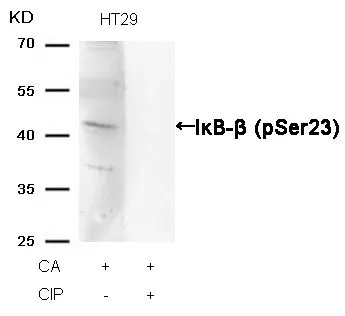
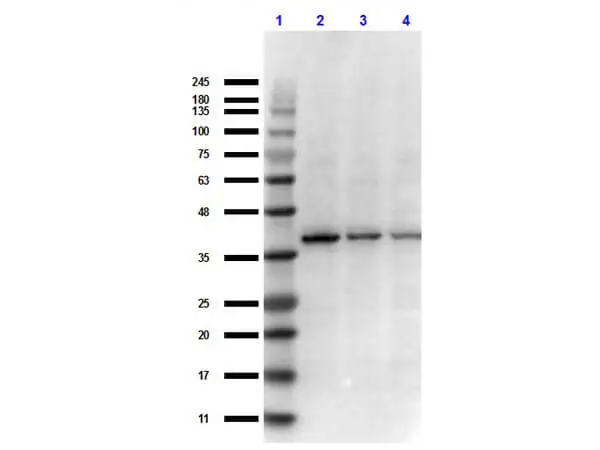
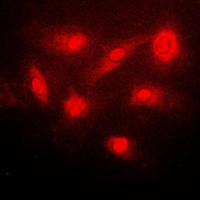
![IHC-P analysis of human stomach tissue using GTX34098 IKB beta antibody [1F3]. Negative control (the lower left coner) was secondary antibody only. Antigen retrieval : Sodium citrate pH6.0 was used for antibody retrieval (>98oC, 20min) Dilution : 1:200](https://www.genetex.com/upload/website/prouct_img/normal/GTX34098/GTX34098_20200622_IHC-P_040_w_23060801_913.webp)
![IHC-P analysis of human kidney tissue using GTX34099 IKB beta antibody [8D11]. Dilution : 1:200](https://www.genetex.com/upload/website/prouct_img/normal/GTX34099/GTX34099_20200622_IHC-P_317_w_23060801_740.webp)
